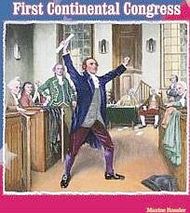First Continental Congress
The First Continental Congress was called together in 1774, with 55 delegates representing twelve of the thirteen colonies (Georgia did not send a representative). This body debated over what the colonies should do, if anything, in reaction to the Intolerable Acts passed by Parliament that year. The First Continental Congress successfully boycotted British goods coming into the colonies, drastically reducing imports. It was the first step towards a written constitution, establishing statements of rights and principles. The participants agreed that a Second Continental Congress should meet the following year.
Background
The First Continental Congress was brought about directly by a series of Parliamentary acts intended to put an end to such disturbances as had arisen in connection with the tea tax. Most of these measures were directed against Massachusetts, but the other colonies saw in them a menace to their own liberties as well, and the protest was general. New York and Rhode Island proposed a general congress. The Virginia House of Burgesses appointed a day of fasting, and, when dissolved for this action, immediately formed themselves into a convention and advised, among other things, annual inter-colonial congresses. The actual call, however, came from Massachusetts in June, 1774. The congress met in Philadelphia in September of the same year, with fifty-five delegates present, representing twelve colonies.
In Georgia, the governor had succeeded in preventing the appointment of representatives. The work of the congress consisted in the drawing up of a declaration of rights hardly more radical than that of the Stamp Act Congress, together with a petition to the king, and in the more important work of establishing the "Continental Association" to enforce the non-importation agreements already existing. Before adjournment in October the congress provided for the meeting of a new congress in May of the following year, in case the grievances of the colonies were not redressed in the meantime.[1]
among the 57 delegates at attendence at this metting were two furture presidents george washington john adams samuel adams john jay patrick henery peyton roundolph
